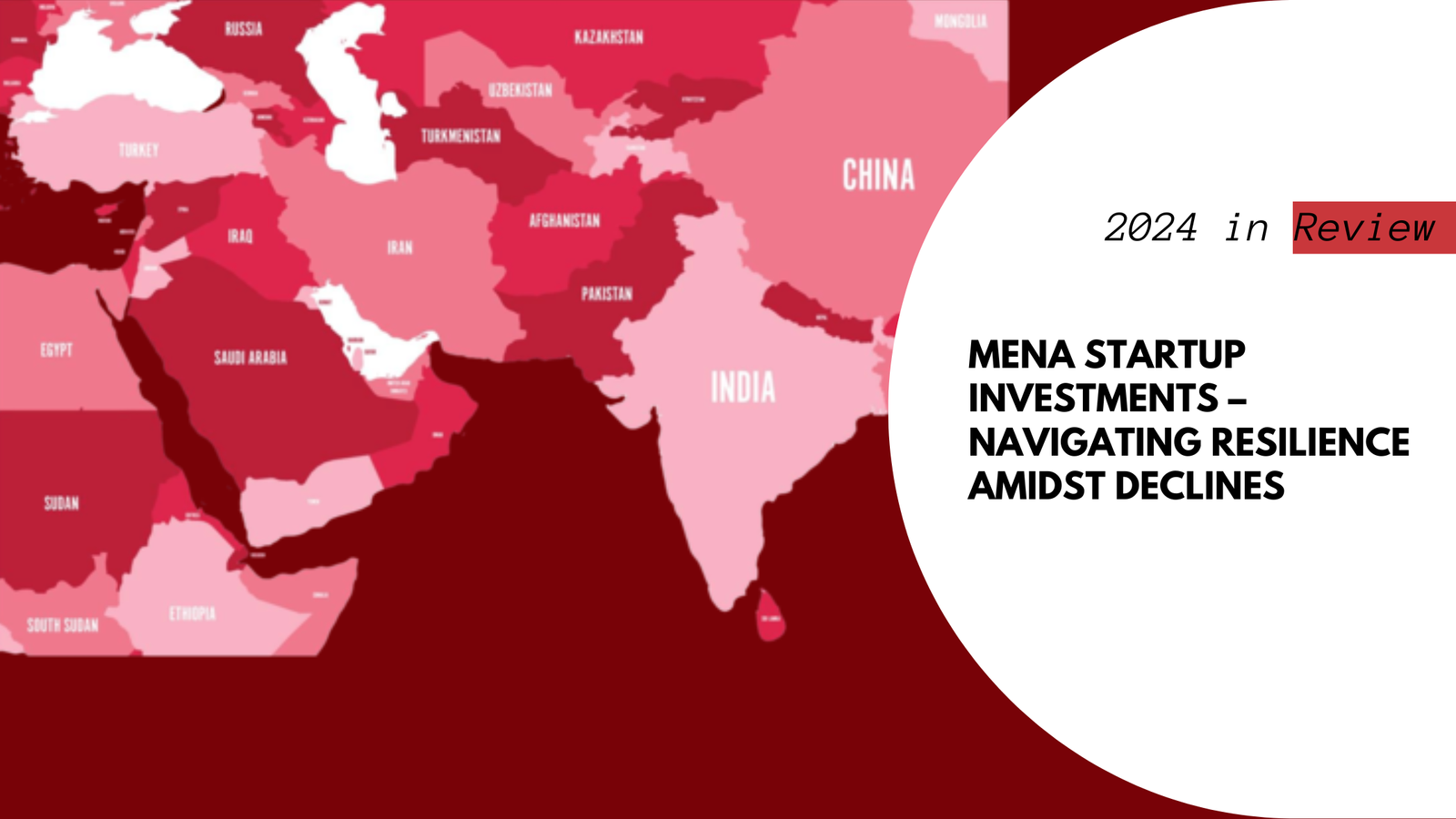The year 2024 marked a significant chapter in the startup ecosystem across the Middle East and North Africa (MENA). Despite a downturn in funding, the region displayed remarkable resilience, showcasing a dynamic ecosystem that continued to attract global investors and foster innovation. This article dives deep into the key trends, challenges, and growth areas that shaped MENA’s startup landscape in 2024, offering a comprehensive analysis of the shifting tides in investments.
The Funding Slowdown: A Wake-Up Call or a Temporary Dip?
MENA’s startups raised $2.3 billion in 2024, representing a 42% decline year-on-year (YoY). This drop has raised alarms for many, but a closer look reveals a more nuanced story. The decline in funding can largely be attributed to the reduction in debt financing, which is down 68% from the previous year. If we exclude debt financing, the funding decrease stands at a more modest 11%, suggesting that while the funding environment is cooling, venture capital continues to flow, albeit at a slower pace.
The decline in funding is partly a reflection of broader global economic uncertainties. Yet, it also indicates that MENA startups may be entering a new phase of maturity, where fundraising rounds are more selective, and the emphasis shifts from rapid growth to sustainable development.
Resilience in Numbers: Rising Deal Volumes and Diverse Sectors
Even amidst the funding decline, the MENA startup ecosystem saw an increase in activity. The total number of deals climbed to 610, up 3.5% YoY. This highlights an important shift: while the size of investments might be shrinking, the number of startups securing funding is on the rise, signaling that investors are looking for early-stage opportunities across various sectors.
A key takeaway here is the growing diversity in sectors receiving funding. In 2024, traditional powerhouses like fintech, SaaS, and e-commerce continue to dominate, but emerging fields like Web 3.0 also garnered substantial investments, showcasing the region’s openness to new technological trends.
Key Regional Insights: UAE and KSA Lead the Charge
The United Arab Emirates (UAE) maintained its position as the top-funded country in the region, securing a staggering 50% of total MENA investments. With $1.1 billion raised across 207 startups, the UAE continues to benefit from its robust infrastructure, government-backed initiatives, and strategic location as a business hub. This dominance is reflective of the country’s sustained efforts to create a conducive environment for tech-driven ventures, with Dubai leading the charge.
Saudi Arabia followed closely with $700 million raised through 186 deals, accounting for 30% of the region’s total deal volume. The country’s push to diversify its economy under Vision 2030 is creating fertile ground for startups, particularly in sectors like SaaS, which saw notable growth. Riyadh, with its rapidly growing tech scene, continues to be a major magnet for both local and international investors.
Egypt, with $334 million in investments across 84 deals, marked another solid year for its growing startup ecosystem. Despite challenges, the country’s tech-driven transformation is yielding positive results, with Cairo increasingly seen as a startup hub for the region, especially in sectors like fintech and e-commerce.
Emerging Markets: North Africa and Smaller Ecosystems
While larger markets like the UAE, Saudi Arabia, and Egypt dominate the investment landscape, smaller ecosystems are also showing promise. Oman’s rise to fourth place in the rankings with $41.5 million indicates growing investor interest in this relatively untapped market. Morocco and Tunisia, leading the North African region, raised $20.8 million and $13.1 million, respectively. Though smaller in scale, these markets are seen as long-term growth opportunities, with many investors keeping an eye on their untapped potential.
Other smaller ecosystems like Jordan, Qatar, and Lebanon showed modest growth, signaling that, with the right strategies and investments, they could see significant jumps in the coming years.
Sector-Specific Growth: Fintech Dominates, Web 3.0 Gaining Traction
One of the standout sectors in 2024 was fintech, which accounted for a whopping 30% of total funding ($700 million). The sector continues to thrive in MENA, driven by an increasing demand for digital banking, payment solutions, and financial inclusion across the region. Startups in this space are well-positioned to capitalize on the growing fintech adoption rates, which are being driven by both consumer demand and government support for financial innovation.
Web 3.0 also emerged as a key player, attracting $256.8 million in investments. This is a clear indicator that MENA is embracing the future of decentralized technologies, with blockchain, NFTs, and cryptocurrencies gaining mainstream attention. Investors are beginning to recognize the potential of these technologies in reshaping sectors such as finance, real estate, and entertainment.
E-commerce, too, performed well in 2024, raising $253 million, driven by increased demand for online shopping and the growing adoption of digital platforms in consumer markets.
Early-Stage Investments: A Bright Spot
Despite the dip in overall funding, early-stage startups saw a notable uptick, raising over $1.2 billion in 2024. This suggests that while large, late-stage funding rounds are fewer and farther between, there is still a thriving ecosystem for new ventures looking to make their mark. Investors are increasingly backing early-stage startups that demonstrate strong potential and innovative ideas, signaling that venture capital remains committed to nurturing the next wave of entrepreneurial talent in the region.
Gender Representation: A Slow but Steady Shift
The funding for female-founded startups saw incremental progress in 2024. These startups raised just $27.6 million, accounting for only 1.2% of total funding, but this represents a modest improvement over 2023 figures. Additionally, startups co-founded by both men and women raised $192 million. While gender disparities in funding remain a challenge, these numbers show that progress is being made, albeit slowly. Investors are becoming more aware of the importance of diversity in the entrepreneurial space, and as such, we are likely to see more targeted initiatives aimed at supporting female founders in the future.
The Road Ahead: Key Takeaways for MENA Startups and Investors
As we look ahead, several key trends and considerations emerge for startups and investors in the MENA region:
- Diversification Is Key: Investors are moving away from placing all bets on a single sector. Fintech and SaaS continue to perform well, but sectors like Web 3.0 and e-commerce show considerable promise. Startups should aim to diversify their offerings and tap into emerging trends to stay competitive.
- Early-Stage Investments Lead the Charge: The trend towards backing early-stage startups is set to continue. Investors are looking for scalable ideas with high potential, so founders should focus on innovation, sustainability, and scalability from the outset.
- Regional Synergies Are Increasing: As the region’s ecosystems become more interconnected, there is increasing collaboration between countries like the UAE, Saudi Arabia, and Egypt. Startups looking to expand their reach should explore cross-border opportunities and partnerships.
- Gender Diversity Is a Long-Term Focus: Although female-founded startups continue to receive a small fraction of total funding, the conversation around diversity is gaining momentum. Startups and investors alike should prioritize diversity, as it will be a key factor in driving long-term growth and innovation.
- Navigating Economic Uncertainty: Global economic trends will continue to influence MENA’s startup ecosystem. Both startups and investors need to adopt strategies that account for potential market fluctuations, focusing on building sustainable and adaptable business models.
The MENA startup ecosystem in 2024 faced challenges, but it also showcased significant resilience. While overall funding declined, the region continued to see growth in deal volumes, sector diversity, and early-stage investments. With strong leadership from countries like the UAE and Saudi Arabia and promising developments across smaller ecosystems, MENA’s startup future remains bright. Investors and founders alike need to stay agile, embracing new technologies, fostering innovation, and addressing key challenges like gender diversity to ensure the continued success of the region’s entrepreneurial landscape.
As the region navigates these evolving dynamics, MENA startups are well-positioned to become key players in the global startup ecosystem, driving innovation and investment opportunities for years to come.




